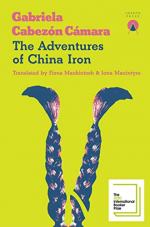
|
| Name: _________________________ | Period: ___________________ |
This quiz consists of 5 multiple choice and 5 short answer questions through Section 3: "Part Two: The Fort": "Dressed to the Nines" through "A Bunch of Short Dark Hapsburgs".
Multiple Choice Questions
1. In "By Dint of Force," what does Liz say is the source of Great Britain's power?
(a) Intelligence.
(b) Speed.
(c) Weapons.
(d) The monarchy.
2. In "Tank You Señora for Cure Me," what causes the pampas to look as if it is erupting?
(a) Stampeding cattle.
(b) Mountains.
(c) An earthquake.
(d) A thunderstorm.
3. What does the chapter title "Everything Covered Me like a Second Skin" refer to?
(a) The constant glare of the sun.
(b) The new fabrics that China Iron has become used to.
(c) The new language and customs that China Iron is gradually learning.
(d) The dust that China Iron and Liz are always battling.
4. In "That's Also Something You Eat and Drink with Scones," when China Iron says, of Liz, "She was my North and I was the quivering needle on a compass," (51), what rhetorical technique is being used?
(a) Onomatopoeia.
(b) Allusion.
(c) Metaphor.
(d) Simile.
5. In "That's Also Something You Eat and Drink with Scones," what criticism does China Iron level at her own country?
(a) It produces a lot of carcasses.
(b) It ignores the suffering of the Indians.
(c) It is not advanced scientifically.
(d) It is too focused on men.
Short Answer Questions
1. What Biblical allusion does China Iron make in "Tank You Señora for Cure Me"?
2. In "At the Mercy of the Caranchos," what do China Iron and Liz see whenever it rains?
3. In "That's Also Something You Eat and Drink with Scones," what realization does China Iron have about the tea she is drinking?
4. In "British Science," what is a "Franklin rod" (53)?
5. In "Tangled Legs," what word does the Colonel use to refer to his female servants?
|
This section contains 354 words (approx. 2 pages at 300 words per page) |

|




